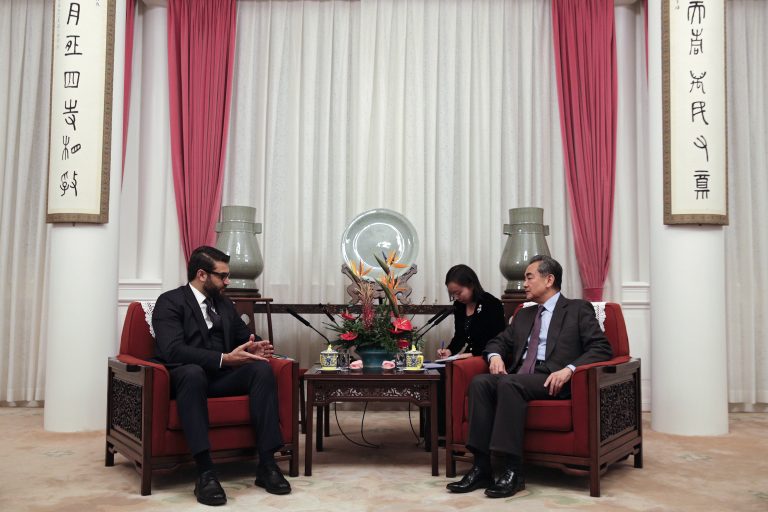With the U.S. withdrawing from Afghanistan, Communist China has started to position itself to benefit from the situation. CCP-backed media has run articles boasting how the presence of Chinese companies and the involvement of Beijing will bring prosperity to the war-ravaged country.
A Global Times article from Aug. 24 paints Beijing’s presence as providing “genuine” aid to reconstruct Afghanistan’s economy. It states that Chinese State-Owned Enterprises (SOE) have adopted a “wait-and-see” approach. It stated that Chinese private companies “are set to stand firm” in Afghanistan “despite Western governments’ potential sanctions on the Taliban.”
The article went on to criticize Western media for “hyping” up the possibility of Chinese companies exploiting Afghanistan’s rich mineral deposits. The Global Times also claimed that the Taliban leadership has “offered an olive branch” to small and medium-sized Chinese investors.
“We saw Taliban members in every street and block… When they heard about business hurdles in China Town, they would send higher-level officials, asking about the difficulty and how they could help. They say that Chinese people are friends, and should not be afraid to ask if they run into any trouble,” Yu Minghui, director of the China Arab Economic and Trade Promotion Committee, told the Global Times.
The article raised concerns that Western sanctions on the Taliban might cut off companies operating in Afghanistan from the global banking system, similar to the way U.S. sanctions have affected the Iranian economy. However, Chinese businessmen are “relatively immune” to such sanctions and have “backup plans” to deal with such situations, according to the article.
Success
You are now signed up for our newsletter
Success
Check your email to complete sign up
The Taliban has also expressed an open mentality towards communist China’s investments. In an interview with Chinese state-run CGTN television, Taliban spokesman Suhail Shaheen stated that “China is a big country with a huge economy and capacity. I think they can play a very big role in the rebuilding, rehabilitation, reconstruction of Afghanistan.” He said that the Taliban and CCP have been in contact for a long time. Beijing has appointed a new contact person for the Taliban who recently held a meeting with the terror group.
Mineral wealth, economic development
According to estimates, Afghanistan’s mineral wealth could be $3 trillion. The country is believed to possess one of the largest lithium reserves in the world. Lithium is a critical element for electric batteries used in cars, laptops, and cell phones. In addition, there are also sizable deposits of iron, copper, mercury, lead, coal, and uranium.
An Aug. 17 report published by CNBC warned that Beijing might align itself with the Taliban to “exploit Afghanistan’s rare earth metals.” It immediately drew criticism from Chinese media. The Global Times stated that Washington might launch its “notorious sanction measures” in Afghanistan.
“The U.S. is in no position to meddle with any potential cooperation between China and Afghanistan, including on rare earths. The so-called ‘warnings’ in the CNBC report show that American firms doing business in Afghanistan are dissatisfied with Washington’s hasty evacuation and therefore the loss of their ‘privileges,’ and it also reveals the U.S.’ fear of possible advancement for China with regard to the rare-earth sector,” the article stated.
However, China has suffered in the past when investing money in Afghanistan. During the mid-2000s, SOE Metallurgical Corp. of China Ltd. won a $3 billion deal to mine copper at Mes Aynak, located near Kabul. More than a decade later, the project is still in limbo. The extreme political uncertainty and security threats in the country basically make any investment a high-risk one.
“Everyone’s just in crisis mode… I don’t see the entrepreneurs getting back to business unless there’s a huge overhaul in the Taliban’s behavior. And there’s nothing I’ve seen that makes me think that’s going to happen,” Sarah Wahedi told Bloomberg. Wahedi is a 26-year-old tech entrepreneur from Afghanistan who recently fled the country,
There is also the question of whether mining activities will actually benefit the common citizens of Afghanistan. Having rich resources does not necessarily mean that the region will become prosperous. Nigeria, Iraq, and Brazil, for example, are all middle-income nations despite being oil-rich. Whether the multi-trillion-dollar mineral wealth of Afghanistan translates into economic prosperity for its people is something that remains to be seen.














